Baptist Union Council: October 2016
A report from the October 2016 meeting of Baptist Union Council
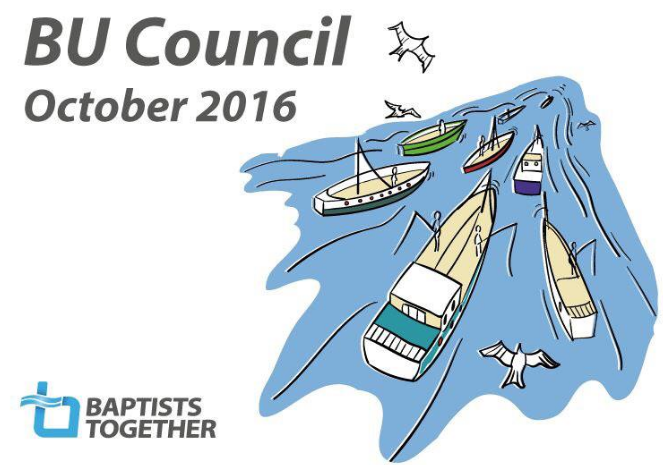
Overview
Baptist churches as Beacons of Hope in their communities, the future of the Baptist Assembly, Ministerial Recognition Rules and some further reflection on Same Sex Marriage were among the main agenda items at the latest meeting of Baptist Union Council.
Council members met at the Hayes Conference Centre in Swanwick on 13-14 October. Worship was led by Iain Pope, minister of Holly Lodge Baptist Church in Ipswich. He cited the early church as described by Luke in Acts 2. ‘I hope and pray that that’s how we approach Council,’ Iain said. ‘Yes we are here to do business. But we are here to do church, building God’s Kingdom.’
Beacons of Hope reflections
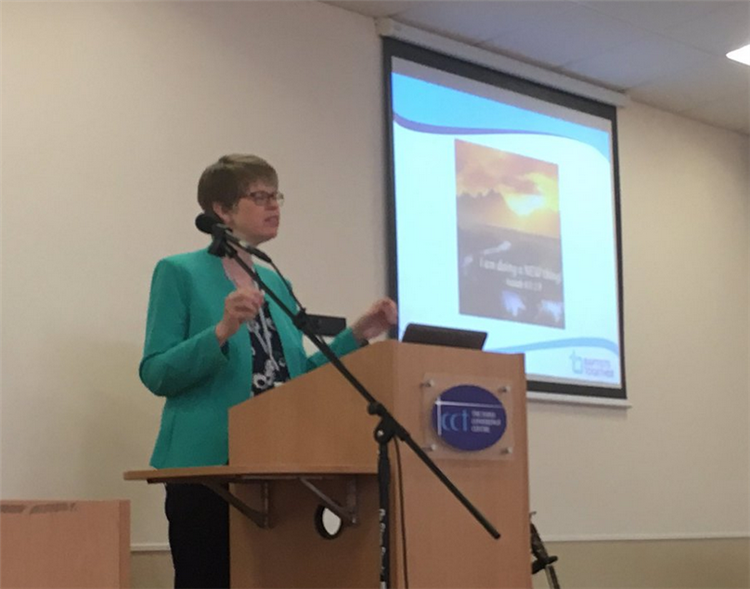 ‘Our desire is that all our churches in Baptists Together may be ‘beacons of hope’, sharing the good news of Jesus in the places they are,’ said General Secretary Lynn Green.
‘Our desire is that all our churches in Baptists Together may be ‘beacons of hope’, sharing the good news of Jesus in the places they are,’ said General Secretary Lynn Green.
She explained Beacons of Hope is being developed out of the Beacons of Prayer call issued to churches last year. We live in times of challenge, uncertainty and political change and we have a distinctive role to play in our communities.
Lynn believes that churches that are Beacons of Hope in their communities are:
-
Inspiring a longing for God
-
Inspiring a longing for mission
-
Inspiring a longing for relationship
This was expressed through a venn diagram visual which also pointed to the practical outworking of these things in ‘loving service, holiness and Holy Spirit empowering’.
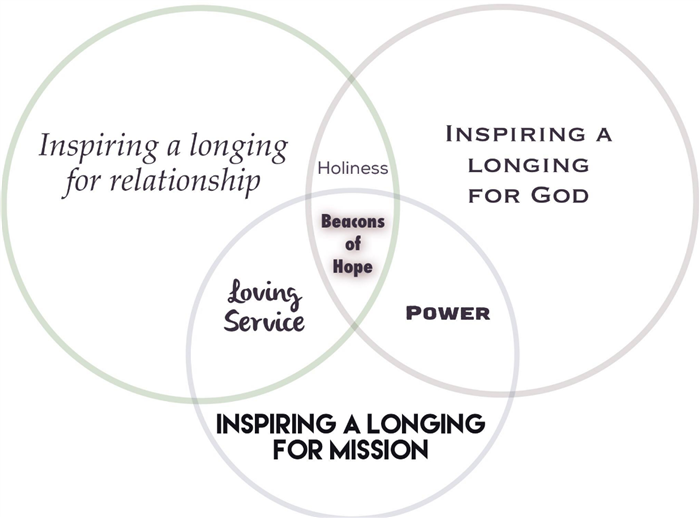

‘We want our churches to have the confidence to be out in their community, sharing the Good News of Jesus.’
She said that Beacons of Prayer – a call to prayer to wait on God and make space for Him to move - had resonated with many people. It is hoped that Beacons of Hope would provide a visual focus that would continue to inspire and challenge us to be all that God is calling us to be.
Council members were encouraged to identify a church that is a Beacon of Hope in their area – and were then invited to pray for them.
Earlier Lynn had spoken about how God is on the move in so many areas of the country.
She mentioned the Yorkshire Baptist Assembly where ‘everyone I spoke to, people were talking about seeing baptisms.’ She also highlighted Stockton Baptist Tabernacle further north, which had seen over 100 baptisms. A number of churches like Stockton are working with refugees, which was resulting in baptisms and impacting the whole church, challenging and encouraging congregations.
She also highlighted The Turning, the street evangelism ministry which began in Reading. There had since been a Liverpool Turning, and there were plans in a number of different towns and cities. She said there was a general openness to the spiritual, she siad with ‘phenomenal numbers of people in the street willing to be prayed for, open to knowing about Jesus.’ In a four week period in Reading 1850 people were prayed for, with many first time commitments and rededications to Christ.
Citing all this activity, Lynn added, ‘I think it shows God is working in all sorts of ways. He is on the move. We need to be reflecting on that.’
New churches
Four new churches that have already been accepted into membership by their Associations were welcomed by Council. Three were from the South Eastern Baptist Association: Community Church, Robertsbridge; Grow Church, Ashford; St John’s Baptist Church, Bexhill (all SEBA) The fourth – Dickens Heath Church – is from the Heart of England Baptist Association.
The Baptist Assembly
A large portion of this Council was devoted to beginning to reflect on the future of the Baptist Assembly. Stephen Keyworth explained the Futures Process had recognised the need to do something different with Assembly, due to factors such as falling attendance, its growing cost, and organisational changes. There had been a commitment to three one-day Assemblies for 2015-2017, with a review after the second year. A wide-ranging survey has now been undertaken, with 1,000 responses. The survey had asked people about programme, what they would do without, why have an assembly, and the future of it and what they would support.
Those completing the survey were overwhelmingly white British (97 per cent), over 45 years old. As many want it to be a celebration as a deliberative event, with debates over serious issues, Stephen said. One of the key things to emerge from the survey was connecting, physically being together.
He highlighted a number of quotes from the survey:
“Assembly is not working in its current format. Stop making it appealing. It is too essential to be popular.’
"Less of a jamboree and find room for serious debate on major issues whether in a Baptist context or outside of it”
“Be bold, throw a vision of what the Assembly could be out to the movement and see who gets on board with it”
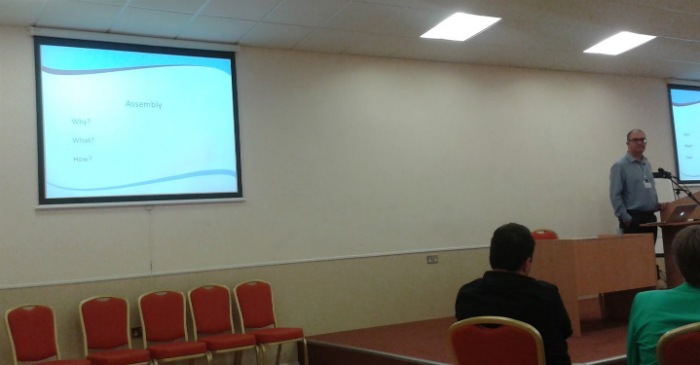 He said that while there had been much to be proud of about the last two Assemblies, we had been ‘tinkering at the edges of a four-day Assembly’. In order to really re-envision Assembly, we need to start a bit further back, ‘with a blank sheet of paper’.
He said that while there had been much to be proud of about the last two Assemblies, we had been ‘tinkering at the edges of a four-day Assembly’. In order to really re-envision Assembly, we need to start a bit further back, ‘with a blank sheet of paper’.
He encouraged members to have discussion around tables the following questions:
-
Why? Should we as movement that is Baptists Together have an Assembly?
-
What? Does that mean in terms of what’s required?
-
How?
Stephen said a decision needs to be made at the next Council about the Assembly in 2018. The final one-day Assembly as planned in the three year cycle will take place in Harrogate in 2017. A ‘broad direction of travel’ is needed in March for what happens in 2018 and beyond.
Fit4Mission
 Stuart Davison, Regional Minister Team Leader of the South Eastern Baptist Association, gave an update on the Fit4Mission survey findings. The survey had given a range of information about churches’ membership and mission activities.
Stuart Davison, Regional Minister Team Leader of the South Eastern Baptist Association, gave an update on the Fit4Mission survey findings. The survey had given a range of information about churches’ membership and mission activities.
It had revealed that around half our union’s churches are middle class, around a quarter are working class. There is a difference between churches’ perception of growth, and what is actually happening, he continued. While there are ‘some really good signs of growth’, around half of the churches which identified as being constant are actually declining.
Tailored reports will be sent to each Association, and the full Fit4Mission report will be uploaded to the Baptists Together website. Alongside will be useful material for local churches. In determining whether our churches are fit for mission, they need to be able to self evaluate, said Stuart. He added this is ‘not just about numbers’. There will be a self-help tool for churches that unpacks areas under the banners of Faith, Hope and Love.
He is calling for changes to the annual return forms to give more useful data for both local churches and Associations, such as identifying new members (were they 2nd generation conversion; transfer; conversion; restoration; or other?)
Council members were invited to discuss what big themes were emerging.
Stuart said that we talk about being missional movement, which provokes two questions: are we missional? And are we moving?
Same Sex Marriage reflections
The previous Council in March had seen members agree the statement Baptists Together and Registration of Buildings for Same-sex Marriage. A portion of this Council was devoted to reflecting on the response to that statement, including in relation to ministerial conduct rules.
Stephen Keyworth explained how the statement, alongside a letter from Lynn Green, had been communicated to around 4,500 people. He had subsequently received 108 responses: 22 had welcomed the statement; two were concerned it was not strong enough; while 84 had been disturbed/disappointed. The vast majority of these responses had come before the end of April; there had been very few since he had made a statement at the Baptist Assembly in May.
Respondents had raised a number of issues. Some had questioned whether it was contrary to the Declaration of Principle, the assumption being that the statement prevents a local church from discerning the mind of Christ ‘and thereby limits a pastoral and missional response only to that which Council “urges”.’
‘That was the assumption; I don’t believe it was the intention,’ said Stephen.
He explained that the inclusion of the section concerning ecclesiology acknowledges that there will be differing pastoral and missional responses by local churches. What Council did was to provide a wider context for discernment as part of our ‘walking together’ and ‘watching over each other’. This has always been a part of Baptist shared life at its best and does not run contrary to our DoP, Stephen said.
He continued, ‘Council was very clear in affirming traditional marriage and in using the language of ‘urging’ and ‘refraining’ Council acted (in my understanding) in an entirely appropriate manner, having listened to the discernment of others, but at the very limit of Council’s authority.’
Ministerial Recognition Rules
In the light of the Historic Cases Review and recommendations of the Ignite Report, Council approved a number of changes to the Ministerial Recognition Rules. The key areas of change include the requirement that ministers have regular training in safeguarding which is relevant to their context. The Ministerial Recognition Committee (MRC) has agreed some guidance notes regarding safeguarding training and DBS enhanced disclosures that will soon be made available to all ministers.
Following on from the last Council and the statement regarding the registration of church buildings for SSMs, Council considered a paper from the MRC regarding guidance for ministers. The general direction of travel is that Council did not believe it would be helpful to add any new rules, but that further consultation was necessary with Associations before guidance notes are brought by MRC in March 2017.
Trustees
Chair of the Trustee Board, Rich Webb, minister of Upton Vale Baptist Church in Torquay, shared highlights from the board's report. These included the move for the Baptist Union of Great Britain to become an incorporated organisation. At the moment this is at a consultation stage, said Rich, and will need to come back to Council.
There was also an update on the future of Baptist House. After exploring a number of options, a decision had been made jointly with BMS to modernise and refurbish, and free up space for letting. Work is due to begin next month. ‘This was the most cost effective and best stewardship option,’ said Rich.
Nominations committee
Council members voted to elect Christine Carter to the Baptist Union trustee board. Christine is an administrator in the NHS, has been a street pastor for six years, and is married to Matt, a Baptist minister. Their church is in Hastings, Sussex.
Her name was brought by Rupert Lazar of the Nominations Committee. Following this vote Rupert spoke about how the committee had sensed a call to change, as it wasn’t achieving the ideal levels of diversity. There will be a new name – the Baptists Together Key Role Nominations Team – and it will operate through a network of relationships, which will hopefully lead to discovering a wider balance of people within the family. A list of groups and individuals are being developed.
‘We need a new way of working,’ Rupert said. ‘We’ve had a sense form the Lord that this is a better way of what we’re being asked to do.
‘We hope we will go to these networkers and they will point us in the right direction.’
John Levick, our Union’s treasurer, said a number of people with great expertise and who had not served before, had been identified for finance roles.
‘The (nominating) group can only do so much. It’s the responsibility of all of us to put forward people who can do the roles. There are people out there.’
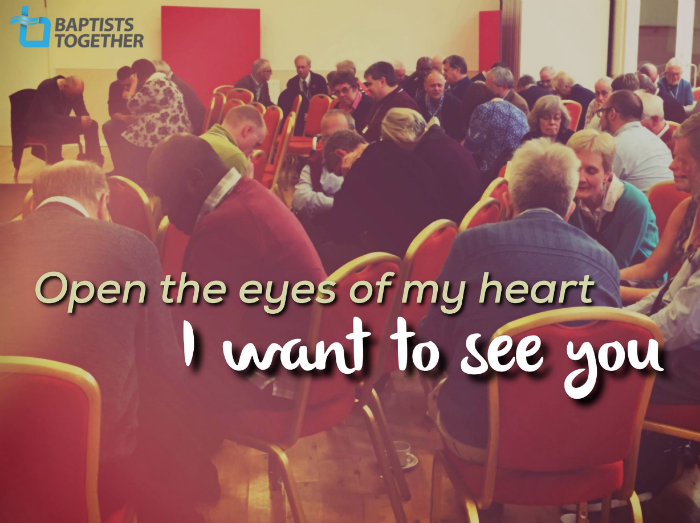
Baptist Times, 19/10/2016